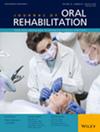Dysphagia Prevention Strategies for Community-Dwelling Older Adults: A Scoping Review
Abstract
Background
Swallowing difficulty, or dysphagia, is a common issue in aging populations, including those living in the community, due to age-related changes in sensory and motor functions. Effective prevention strategies are essential to avoid complications and improve well-being in this population.
Objective
The objectives of this scoping review were to identify and summarise interventions for preventing dysphagia in community-dwelling older adults.
Design
Following Arksey and O'Malley's framework, studies were retrieved from six databases: Embase, Ovid-Medline, Cochrane Library, CINAHL, Web of Science, and Scopus. The search was completed in July 2024, with two independent reviewers selecting and evaluating the studies.
Result
Nine studies conducted between 2005 and 2023 were identified, including seven randomised controlled trials and two quasi-experimental studies. Three categories of dysphagia prevention were identified, including exercise, electrical stimulation, and educational programmes, and three studies used more than one intervention (combined intervention).
Conclusion
Exercise-based interventions are the most studied strategies for preventing dysphagia in community-dwelling older adults, with combined approaches also showing promise. However, geographic bias, unclear sample size determination, and a lack of long-term follow-up limit the reliability and applicability of all interventions. Future research should address these gaps to strengthen evidence and improve dysphagia prevention efforts.


 求助内容:
求助内容: 应助结果提醒方式:
应助结果提醒方式:


